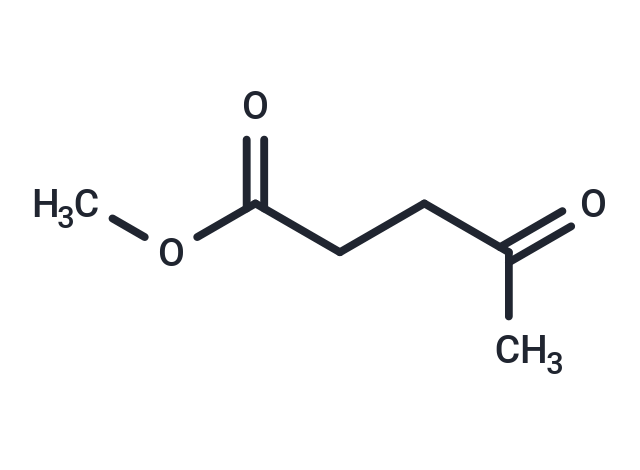 Your shopping cart is currently empty
Your shopping cart is currently empty

Methyl levulinate is a green reagent derived from biomass, widely used in biochemical experiments and drug synthesis research.

| Pack Size | Price | USA Warehouse | Global Warehouse | Quantity |
|---|---|---|---|---|
| 10 g | $29 | - | In Stock |
| Description | Methyl levulinate is a green reagent derived from biomass, widely used in biochemical experiments and drug synthesis research. |
| In vitro | Methyl levulinate was converted to methyl 4-alkoxyvalerate by reductive etherification of fatty alcohols, resulting in biomass-derived surfactants with very good surface tension and critical micelle concentration properties. Among different bifunctional acid/metal catalysts, Pd gave the best Results on carbonic acid-containing sites. The reaction occurs via the formation of an enol ether intermediate followed by hydrogenation. Pd in high-density planes is the active hydrogenating species and the optimum crystal size was found to be around 10 nm. The reductive etherification of fatty alcohols was extended to other aliphatic and cyclic ketones and aldehydes obtained from biomass, and excellent Results were obtained on supported Pd catalysts using the reaction route and experimental conditions described in this work. [1] |
| Synonyms | NSC 24874, Methyl β-acetylpropionate |
| Molecular Weight | 130.14 |
| Formula | C6H10O3 |
| Cas No. | 624-45-3 |
| Smiles | O=C(OC)CCC(=O)C |
| Relative Density. | 1.051 g/cm3 at 20℃ (lit.) |
| Storage | Pure form: -20°C for 3 years | In solvent: -80°C for 1 year | Shipping with blue ice/Shipping at ambient temperature. |
Dissolve 2 mg of the compound in 100 μL DMSO![]() to obtain a stock solution at a concentration of 20 mg/mL . If the required concentration exceeds the compound's known solubility, please contact us for technical support before proceeding.
to obtain a stock solution at a concentration of 20 mg/mL . If the required concentration exceeds the compound's known solubility, please contact us for technical support before proceeding.
1) Add 100 μL of the DMSO![]() stock solution to 400 μL PEG300
stock solution to 400 μL PEG300![]() and mix thoroughly until the solution becomes clear.
and mix thoroughly until the solution becomes clear.
2) Add 50 μL Tween 80 and mix well until fully clarified.
3) Add 450 μL Saline,PBS or ddH2O![]() and mix thoroughly until a homogeneous solution is obtained.
and mix thoroughly until a homogeneous solution is obtained.
| Size | Quantity | Unit Price | Amount | Operation |
|---|

Copyright © 2015-2026 TargetMol Chemicals Inc. All Rights Reserved.